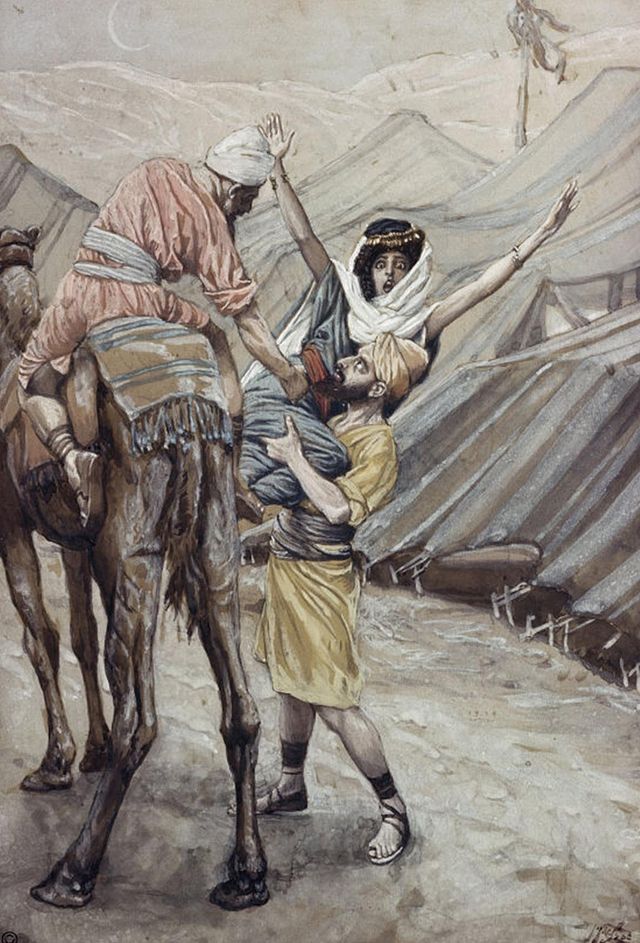Abstract: What is the connection between Amalek’s inveterate hatred of the people Israel, from its first assault on Israel’s stragglers right after the Exodus, and through Haman’s genocidal plot in Persia that was foiled by Queen Esther, and the deep concerns today among American Jews about possible changes in the sensitive status quo regarding conversion to Judaism that the new Israel Government might enact, and our weekly Torah portion that concludes the Book of Genesis?
![[Picture: Jacob accepted the ''non-Halachic'' conversion of Shechem's men... The copyright holder of this image has not been located. Therefore, the use is made according to Article 27A of the Copyright Law. The main copyright holder, please contact: yehezkeally@gmail.com]](https://www.xn--7dbl2a.com/wp-content/uploads/2020/05/גיור.jpg)
[For articles on the “Sabbath of Va-Yehi" in Hebrew, click here]

Rabbi Dr. Yossi Feintuch was born in Afula and holds a Ph.D. in American history from Emory University in Atlanta. He taught American history at Ben-Gurion University.
Author of the book US Policy on Jerusalem.
He is the rabbi of Congregation Shalom Bayit in Bend, Oregon.
* * *
What is the connection between Amalek’s inveterate hatred of the people Israel, from its first assault on Israel’s stragglers right after the Exodus, and through Haman’s genocidal plot in Persia that was foiled by Queen Esther, and the deep concerns today among American Jews about possible changes in the sensitive status quo regarding conversion to Judaism that the new Israel Government might enact, and our weekly Torah portion that concludes the Book of Genesis?
The story behind the story that informs us of Amalek’s animosity to Israel in Biblical days might be even more important than the latter because of its relevance right now. The Rabbis enshrined a folkloric story -- certainly with a didactic message for all times -- that Amalek's bitter enmity could have been avoided altogether had Timna, Amalek’s mother, who came before Israel’s three Patriarchs and asked to be accepted for conversion, been accepted and embraced.
![[Pictured: Amalek… free image designed and uploaded by AndreasHolzner to the website Pixabay]](https://www.xn--7dbl2a.com/wp-content/uploads/2018/08/עמלק-5.jpg)
But all three Patriarchs objected without an excuse or an attempt to help Timna convert and marry in Israel as she quested to do. So Timna went instead to become a concubine to Elifaz, Esau’s son, or Isaac's grandson, the nearest kin to the Israelites; Amalek, wanting to avenge his mother’s humiliation ended up as a foremost bitter enemy to Israel – a people that would not admit his mother to its ranks. Amalek’s hatred was all because of the unwarranted rejection of Timna by Israel’s Patriarchs who speculatively would not approve a conversion for the sole purpose of marrying in.
Today’s headlines inform about prominent leaders of American Jewry who fear the unraveling of the unity among the Jewish people worldwide if the Israeli government stopped recognizing conversions that are performed in the IDF, and in the non-Orthodox communities in Israel, that are not under the auspices of Israel’s Chief Rabbinate. Nevertheless, these conversions are accepted for population registry and the Law of Return.
But what do today's conversion matters, or for that matter the Timna story, have to do with the weekly Torah portion where Jacob on his deathbed in Egypt delivers his ethical will to his children?

Many years have passed since Shimon and Levi perpetrated a gruesome and cowardly massacre of all men in Shechem in the aftermath of the rape of their sister Dinah by the son of the town’s chief. Perfidiously the two brothers pretended that they could be reconciled with the crime committed against their sister if all men in town agreed to be circumcised. The men’s circumcision would entail an effective close partnership between the people of Shechem and the Israelites; it would permit for marriages and trade relations between Jacob’s clan and the town folks. The latter agreed, and while the men were nursing their incision that rendered them immobile, both Shimon and Levi committed that atrocity against the town’s men.
This weekly Torah portion Va-yehi provides Jacob with the opportunity to come clean with his two sons whose challenging question decades back to justify their action he did not answer at the time: ‘’ Should one deal with our sister as with a harlot?’’
From his deathbed in Egypt at 147 years of age, Jacob denounces his two sons Shimon and Levi for ‘’hamstringing an ox’’ (per Genesis 49: 6). But the Torah says nothing about Shimon and Levi castrating the doomed town’s bulls. So, what could Jacob possibly mean?
![[In the picture: Shimon and Levi take Dina and massacre the people of Nablus (Giuliano Bugiardini, 1554). Image is public domain]](https://www.xn--7dbl2a.com/wp-content/uploads/2015/11/מעשה-דינה.jpg)
The Rabbis (in Bereshit Rabba) interpret “they castrated a bull” to mean that Shimon and Levi uprooted a line of potential converts. Why, the male individuals of Shechem willingly accepted and performed circumcision in order to be eligible for inter-marrying with Jacob’s clan. Thus, the Midrash has Jacob chastise his two blood shedding sons for destroying a potential population of converts.
The men of Shechem are the hamstrung ox(en) that Jacob refers to because Shimon and Levi would not accept a conversion for the purpose of marriage; and in so doing they betrayed a disposition of totally unjustified genetic purity. It is for this atrocious crime that Jacob decreed for these two sons a future and permanent dispersal with no independent existence among the eventual tribes that his other sons would evolve into.

Jacob must have then seen conversion in his old age in a different lite in contrast to his negative (''Halachik''?) attitude in the Rabbinic story about Timna. It is easy to see now the common thread that first interlinks Amalek’s enduring rancor against Israel, and then with the present keen concerns for the relations between Israel and the American, if not world Jewry, should non-Halachic conversions in Israel become disqualified for official registry as Jews by the State of Israel, and thirdly the reason behind Jacob’s predicted comeuppance for both tribes to become landless and scattered about among the other tribes.
The relevance of this episode to today’s current affairs is striking. Halachic Jewry in Israel insists only on Halachic conversion process even as many would-be converts in Israel reject this lifestyle and its religious demands. The Halachic rabbinate insists that there is only one way to become Jewish, its way. This despite the fact that it would be a mitzvah and therefore permissible for the State of Israel to accept conversions even if it is known that such Jews by choice would not live by all of the Mitzvoth (‘’First Rabbi in Zion’’, Rabbi ben Zion Meir hai Uziel). Jacob in his tough and sharp words condemning what Shimon and Levi did in Shechem seems to agree with such a practical, if not a more lenient approach to sincere conversions.
[For articles on the “Sabbath of Va-Yehi" in Hebrew, click here]
מצאת טעות בכתבה? הבחנת בהפרה של זכויות יוצרים? נתקלת בדבר מה שאיננו ראוי? אנא, דווח לנו!


